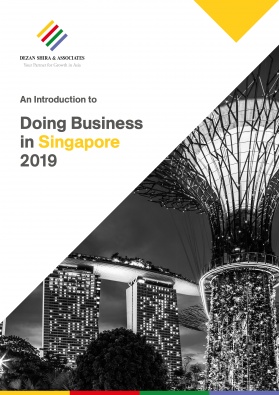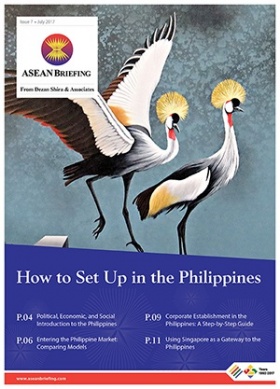The Philippines’ Federal Shift and What it Means for Business
The Philippines is heading towards a significant change in its system of government. The country’s House of Representatives on December 11, 2018 approved on final voting the proposed version of a federal constitution. The shift to a federal charter also forebodes some potential changes in the country’s business environment.
The Duterte government has set up a Consultative Committee (ConCom) that proposed 18 federal states and two autonomous regions in the Philippines – the Bangsamoro region of the south and the Federated Region of the Cordilleras of the north. The federated regions will possess exclusive powers such as collection of taxes and fees in order to become economically viable and sustainable. There will be a 50-50 percent share of the tax revenues, wherein 50 percent goes to the region and the remaining 50 is transmitted to the federal government.
With regards to foreign participation, turning to federalism provides opportunities for investment liberalization.
But it also poses risks to the business climate largely due to the disparities in the local laws and regulations of the future states. In this article, we provide a brief assessment of the opportunities and challenges the country faces amid an anticipated political and socio-economic shift.Opportunities
In a recent report by the World Bank (WB), the Philippines was ranked among the top countries to invest based on four distinct categories: people, environment, relationships and framework. Potential investors are said to be motivated by these factors when investing in natural resources, markets, technologies or brands. However, the Philippines ranked 113th in the WB’s Ease of Doing Business report. The primary concern of businesses is the bureaucratic processes involved in business registration in the Philippines. Also, foreign land ownership is limited, making it difficult for foreign investors to expand their operations fully.
The proposed federal charter will lead to several drastic changes. The federal version espouses the creation of federal states to be governed by a regional body that will have control over public expenditures. In this sense, federalism is expected to foster competition among the states and enhance innovation in order to attract foreign investors. The federal government will also allocate three percent funding out of the annual General Appropriations Act for some regions in need of financial assistance during the transition.
Former finance secretary Margarito Tevez under the Gloria Arroyo administration stressed that amending the constitution will give way to the lifting foreign investment restrictions and getting rid of the Negative Investment List so that foreign investors can enter any business sector.
Although the ConCom decided not to remove the controversial 60-40 ownership sharing, some areas that are to be opened up to foreign investment under federalism include mass media, advertising and educational institutions. These areas are currently not open to foreign ownership, however, the new Negative List signed by President Duterte already included five related areas where 100 percent FDI will now be permitted.
One of the amendments being pursued is providing incentives to foreign investors in the federated regions. Moreover, the ConCom retained the 60-40 provision to prevent Filipino stakeholders from being overwhelmed with foreign control or management of corporations.
The key motivation for the constitutional amendment is basically economic growth especially in the less developed regions. The opportunities have yet to be ascertained considering the potential risk and cost of shifting to a federal nation.
However, the incumbent Trade Secretary Ramon Lopez emphasized that operability is more of a concern rather than risk and cost of the shift. He assured that foreign investors have remained neutral on the issue of the governmental system change, and are rather more observant of any potential changes to the business environment.
Challenges
The challenge to a federalism shift boils down to the Filipino public’s approval of the bill’s passage. For instance, the latest Pulse Asia survey reported that 37 percent of Filipinos are not in favor of the shift while 30 percent may be open to it some time in the future. It also revealed that 55 percent of Filipinos are aware of the proposal for constitutional change.
On the business side, domestic investors are more resistant to federalism than foreign investors. Influential business groups such as the Philippine Chamber of Commerce and Industry and the Joint Foreign Chambers of the Philippines have not issued their position about the government’s plan to shift the form of government. According to these groups, small businesses want federalism, but the bigger ones do not prefer it, although they also noted that some big corporations are open to it.
The country’s largest business groups including the Makati Business Club, Management Association of the Philippines (MAP) and Financial Executives Institute of the Philippines (Finex) are lobbying for a constitutional amendment but merely focusing on economic provisions. Furthermore, the European Chamber of Commerce of the Philippines is vocal about extending support if the Philippines decides to take the federalism route, as there are many best practices in Europe that can be studied upon and benefitted from.
Business sectors are expected to remain critical about a fundamental shift in the system of government. Since the 60-40 economic restrictions will stay under the proposed amendment, foreign businesses would still face challenges to operate under this provision. Further, they can either take advantage or be faced with uncertainties since regional states will have the power over their revenues, local legislations and economic models they choose to follow in relation to their competitiveness as investment destinations. Therefore, foreign investors are more interested to know whether the federated regions will adopt a more hassle-free policy for operating businesses or make it more complicated due to a deviation from the existing national standards. The imposition of more specific variations of local tax rates may bring unforeseen problems to businesses.
Even though MSMEs will have the chance to thrive on specified programs which may address the local needs of the federated region, the challenge also lies on whether state leaders will be capable of enabling local entrepreneurs or enterprises.
About PHP235.5 billion (US$4.433 billion) is estimated to fuel the shift in the Philippine’s government structure. According to the National Economic and Development Authority, the federal charter will inevitably disrupt the growth momentum and infrastructure development efforts. Nevertheless, NEDA insisted on a “forward-looking strategy” that should strengthen the bureaucratic functions of local regions.
Future Prospects
Apart from the TRAIN law which aims to lower CIT, the Philippine government has undertaken significant steps to ease business entry into the country.
Some of the programs being implemented include the Project Repeal: The Philippine Anti-Red Tape Challenge and amendments to the Foreign Investment Act of 1991, the aforementioned Executive Order No. 65 promulgating the 11th Regular Foreign Investment Negative List (FINL) and the Corporate Code of the Philippines which now grants a “one-person corporation” and a perpetual term as the default option for corporations.The Senate has also approved on final reading a proposed tax amnesty bill (Tax Amnesty Act of 2018) which will provide taxpayers a one-time opportunity to settle tax delinquencies.
Considering that the proposal has already passed by the House of Representatives and consolidation of power within the Duterte administration would be the agenda for the upcoming 2019 senatorial elections, a stronger prospect for the federal shift could be seen.
Opponents to a federal shift highlight the possibility of triggering political dynasties and shunning away business prospects. However, the Philippines still retains its attractiveness for investment owing to its the abundant natural resources, a productive workforce and a rising population. A World Bank Group report on attracting FDI pointed out that the size and growth potential of markets are considered the most powerful determinants of FDI.
About Us
ASEAN Briefing is produced by Dezan Shira & Associates. The firm assists foreign investors throughout Asia from offices across the world, including in Singapore, Hanoi, Ho Chi Minh City, and Jakarta. Readers may write asia@dezshira.com for more support on doing business in ASEAN.
- Previous Article The Asia Reassurance Initiative Act and ASEAN
- Next Article Procédures d’importation dans l’ANASE









